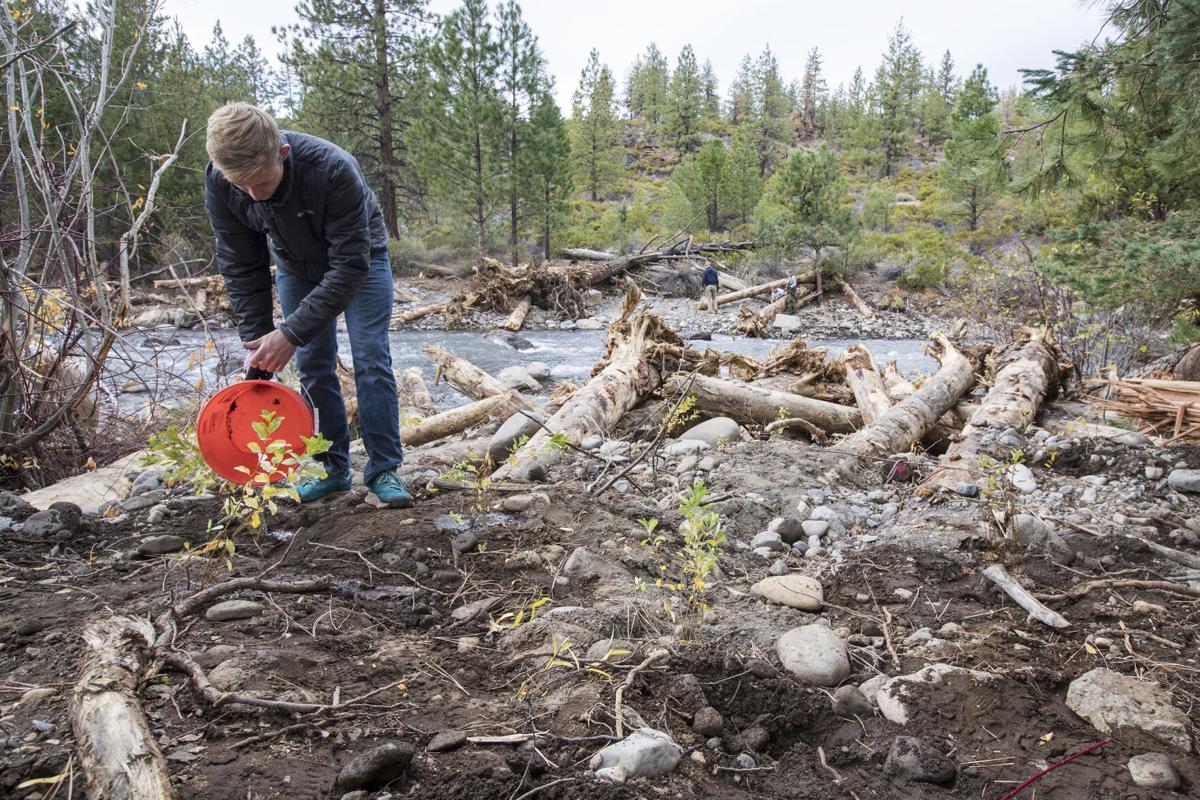This article was published on: 10/29/21 9:28 AM
About two dozen students from Sisters High School split into two groups, with half wading across Whychus Creek to plant hundreds of trees and shrubs along the streambanks.
By sowing the native plants — spirea, dogwood, red dogwood, cottonwood and willow — the students were getting hands-on experience about what they learned in class about riparian areas and restoration.
The Upper Deschutes Watershed Council, which led the students through the work, has partnered with schools for years to connect students to rivers and streams and help them develop a sense of place, a sense of stewardship and learn what the restoration work means and why it’s important.
But this was a special week because students participated in the final phase of a series of restoration projects that began in the early 2000s to remove dams on Whychus Creek and open up 38 miles of spawning and rearing habitat for fish.
Mathias Perle, the restoration program manager for the Upper Deschutes Watershed Council, told students the final dam had been recently removed and chinook salmon and steelhead trout are slowly beginning to return.
Kolleen Yake, the watershed council’s education director, showed students how to plant the native plants and explained how the trees and shrubs will protect the soil from erosion and provide shade for native fish.
“The education, the stewardship, it goes beyond just the individual students that we interact with because they interact with their peers, with their parents, with the community as a whole,” Perle told The Bulletin. “And I think that’s something that’s really changed over the last decade is seeing the community in Sisters supporting and getting behind this work, too.”
The removal of Plainview Dam, the last dam in the 38-mile stretch of water, was delayed in September 2020 and again this summer due to wildfires and smoke.
Multiple entities have worked with the watershed council to remove the barrier, including the Three Sisters Irrigation District, the Deschutes National Forest, the Natural Resources Conservation Service and private water rights holders.
The agencies also installed irrigation-diversion fish screens to prevent fish from entering an irrigation canal and piped an unlined irrigation canal to improve water conservation.
Perle said the project has allowed ranchers to continue getting water from the creek, while protecting fishing and creating a better habitat.
The students who took part in planting the trees and shrubs on Tuesday and Wednesday are part of a long running class at Sisters High School called interdisciplinary environmental expedition.
Glen Herron, who teaches the science component of the class, said the class gives high school juniors the opportunity to study the natural environment in a hands-on fashion.
The class integrates three subjects: English, environmental science and outdoor recreation. And most of the time, students are out in the field to experience what they learn in the classroom, Herron said.
At the beginning of the term, Herron said the class started exploring the Hayden Glacier. Throughout the course, the class works its way through the subalpine, coniferous forest and then down to the desert.
“At each of those elevations, we look at what’s happening locally and politically,” he said.
Herron said the goal is to give students a sense of place and have them learn how things like the geology, restoration efforts and recreational opportunities in the region are interconnected.
“We’ve got to be aware of that to be good stewards,” Herron said. “There’s going to be more and more people on this planet, so how are we going to take care of it? I think that’s so important.”
Oscar Rhett, a senior at Sisters High School who is helping lead the class after participating last year, said the class is popular and attracts a lot of students who want to get outside.
But the class transforms student perspectives, he said, by helping students realize they need to play an active role in taking care of the community and the natural environment.
“If I’m out in the woods, it changed the way I camp; it changed the way I deal with trash,” Rhett said. “It helped me care a little bit more about everything.”




